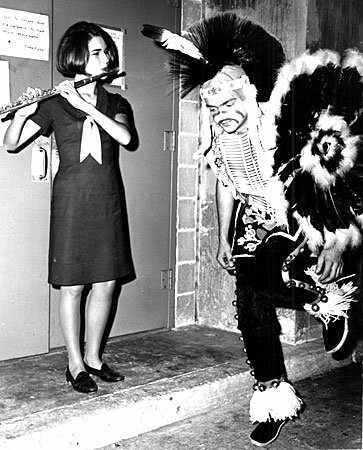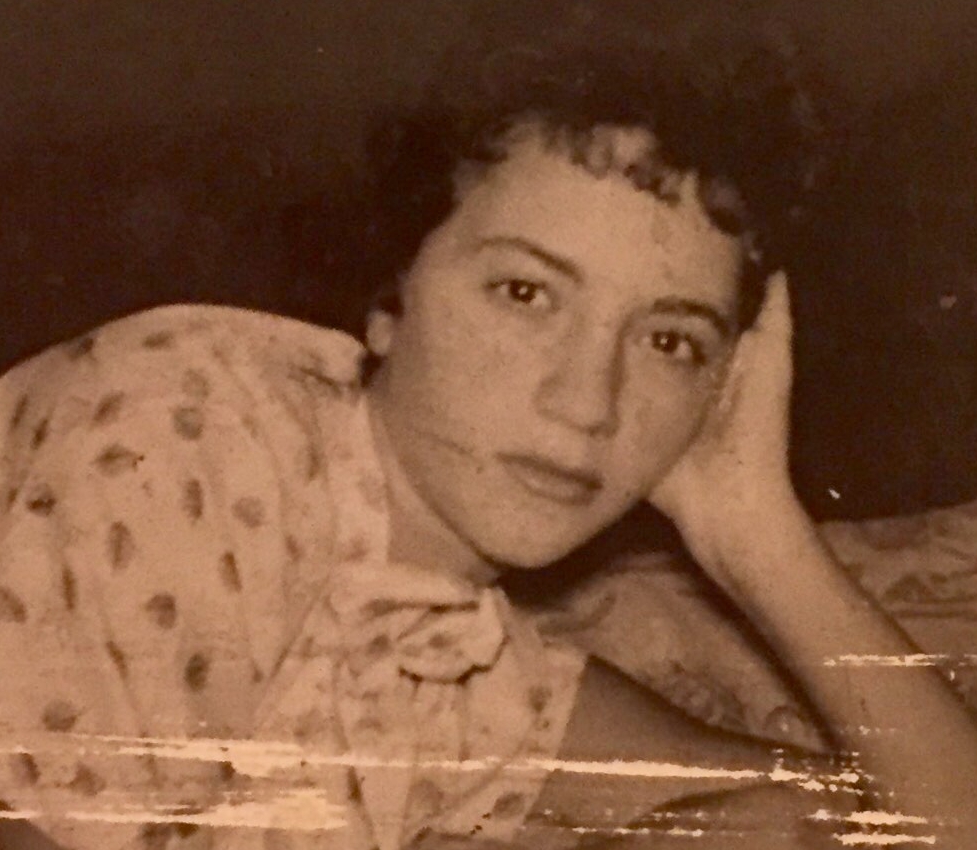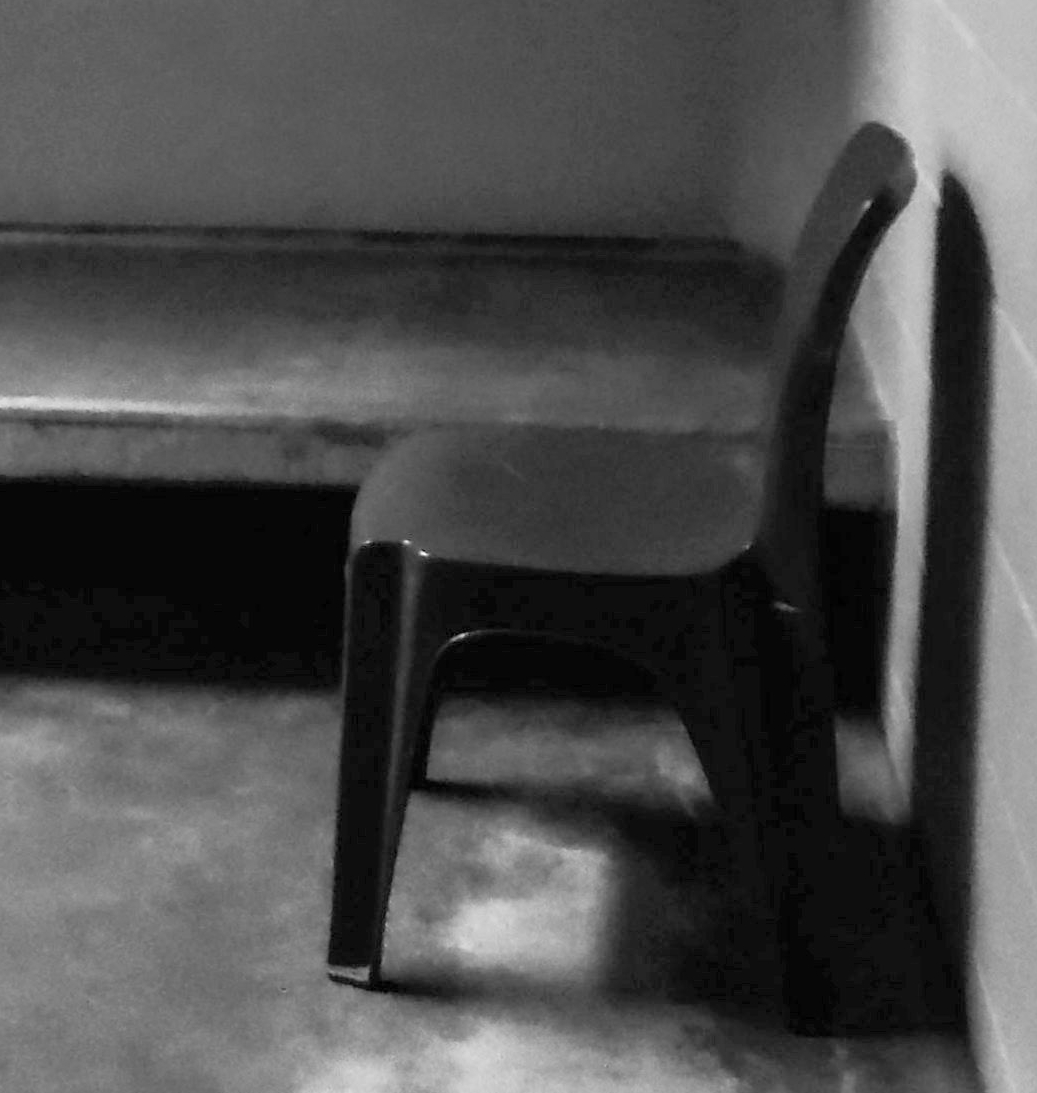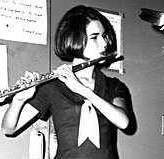My only companion was a large, ancient furnace resembling a grotesque, sooty snowman. Each day when it was time to practice I descended the worn, shaky, wooden stairs to enter a seemingly depressing place: damp, musty smell, walls of grey concrete and red clay, cement floor covered with a thin layer of rust-colored dirt.
Our unfinished basement, dominated by the furnace, had barely enough room for a music stand and me. But acoustically it was the perfect room for practicing the flute: the clay and the unevenness of the walls soaked up sound, forcing me to breathe more deeply to develop my tone, and except for Daddy’s nightly trips to add water to the furnace, the space was all mine. With a little effort I could block out the overhead noise of the TV or, worse, music from the FM Golden Oldies station. My parents spent their evenings in the living room, right above the basement, either watching TV or listening to the radio. Conversation was minimal.
I spent many hours in the basement, but the happiest ones—indeed the happiest hours of my teenage years—were the four hours I practiced each day in the weeks leading up to my audition for the Curtis Institute of Music in Philadelphia. It had been an uphill battle to get to that point. The two significant men in my life, my flute teacher and my father, had vastly different ideas about what I should do after graduation from high school.
My father, who taught Economics at Emory University, insisted I go to Emory because faculty children got free tuition. My flute teacher, Mr. Little, constantly reminded me that my talent would flourish only at a music school, not at a liberal arts college such as Emory.
My father and Mr. Little. My relationship with each of them had changed dramatically over the previous five years. One had been a delightful Daddy for a little girl but was increasingly critical of his teenaged daughter; the other had been a strange, scary flute teacher but became an inspiring mentor, whose kindness and ready smile contrasted sharply with my father’s disapproving scowl. Mr. Little’s words of praise gave me, a shy and skinny adolescent, confidence in my abilities as a flutist and, gradually, in my worth as a human being. I don’t know which came first, love of the flute or joy in earning Mr. Little’s approval.
When I first took flute lessons with Mr. Little, at the beginning of eighth grade, I knew him only as my band director. Ill-suited to that role, he was awkward in rehearsals and unable to find humor in the often-absurd sounds that came from the band. He was not hip. So I had balked at studying with this odd man, but even in the first lesson his inviting smile won me over. He obviously enjoyed teaching students one-on-one, and had a knack for developing talented young flutists. I never thought I would be serious about the flute, but lessons with Mr. Little gradually transformed my casual interest into a burning passion.
My father thought dreams of being a professional musician were delusional. He refused to provide financial support for such folly, and I knew of no way to earn enough money to pay tuition, much less room and board, at a music school. The recurring scenes went something like this:
“Daddy, the one thing I want to do next year is study music.”
“What makes you think you could ever make a living as a flute player? Don’t you think I know anything about economics? You can attend Emory for free. Can’t you see how stupid it would be to pass that up?” He voiced his opinion loudly, sometimes in the form of a yell, always accompanied by his angry look of disapproval.
Cowed by his anger, I would acquiesce for a while. I tried to space these battles strategically to give my father and me time to recover from his anger before I triggered it again.
After weeks of these fruitless arguments, Mr. Little told me about The Curtis Institute of Music in Philadelphia, the one music school in the country that offered each student free tuition, room and board: my father could not balk at the expense. I begged Daddy to pay for a flight to Philadelphia so I could audition for Curtis but he refused. Until he found out there was only one flute opening that year.
“I’ll pay for you and your mother to fly to Philadelphia and audition for Curtis. If you prove to me by winning the audition that you are the best high school flutist in the country, then maybe you’re good enough to go to a music school, but if you don’t get in you must go to Emory and major in something sensible.”
He knew my chances of getting in were less than one in a hundred, so he wasn’t worried about my actually enrolling at Curtis. Still, it surprised me that he was willing to pay for the trip. His anxiety about money made him wary of anything slightly risky and this was, after all, a statistically bad investment. Perhaps he just got tired of my persistent begging.
As soon as my father agreed to pay for the trip—less than two months before the audition—I began figuring out ways to have more time to practice. I knew it would take a colossal effort on my part to have a shot at winning that audition. Four hours of daily practice was my goal, but I didn’t see how I could do that and keep up with my homework. I decided to drop AP English with its heavy reading assignments. The English teacher, who always called me Melinda (my brilliant older sister’s name), was a dour old lady with a thick southern drawl. When I switched to the lower English class she was offended, reminding me almost daily that I had made a foolish decision.
“You do realize that Melinda would never do this.”
But neither she nor my father could dampen my spirits, for I had never been happier than I was during those weeks of intense practicing.
Mr. Little suggested I learn the third movement of the Ibert Concerto for the audition. The piece was technically quite challenging for a high school student; it was also harder to memorize than the other pieces I had learned. I loved the dramatic cadenza, with its wide pitch range from low C to high D-flat. I also liked the musical challenge of making the repetitious B section interesting. I spent countless hours working the triplets in the main sections of the piece in different rhythmic patterns to get the triplets perfectly even, with no accents.
For those six weeks the basement was an exciting place, a place of hope. I memorized the third movement of the Ibert Concerto while staring at dirt walls and an ungainly furnace, but what a joy to work hard and imagine the unthinkable—that I might, despite overwhelming odds, be able to pursue a career in music.
The results of practicing so intensely for the first time in my life, were significant improvements in my tone and technique. But one passage in the Ibert gave me fits: the first tremolo passage at the top of the second page of the flute part. Mr. Little had two other students auditioning for Curtis, and at one lesson when I was struggling with the tremolo he commented, “You know, Virginia has no trouble with that passage.” I was hurt and shocked. He had always been so encouraging and complimentary, and by this time had become a surrogate father to me. That is the only example I remember of his being unkind to me while I was his student. I didn’t know it was a foretaste of what would follow, with more devastating consequences, years later when I became his colleague in the Atlanta Symphony.
The day of the audition arrived, and after weeks of intense preparation, I felt well-prepared to play for the great William Kincaid, solo flutist with the Philadelphia Orchestra. The odds were against me but I didn’t care; through focused practicing I had done all I could to be ready for the audition. The day before the audition Mother and I had flown to Philadelphia. She wanted to sight-see, but I refused, choosing instead to practice in the closet, sound muffled by clothes so I wouldn’t bother other hotel residents.
Before my assigned audition time, Mother and I sat uncomfortably in the metal folding chairs that lined the hallway of an elegant old building on Rittenhouse Square. We were just one of the dozen or so pairs of anxious parents and hopeful flutists, each waiting for the ten minutes that would decide their futures. Through the door to the audition room I could hear the person before me playing the Scherzo from Mendelssohn’s Midsummer Night’s Dream, one of the excerpts I had prepared. To my surprise, he didn’t sound any better than I did; so far so good.
When my turn came to play for Mr. Kincaid I was nervous but resolute. I tried not to think about what the audition meant to me. When I entered the room a short, middle-aged lady introduced me to Mr. Kincaid. With his bushy white hair, big red nose and toothy smile, he looked more like an unkempt Grandpa than a highly esteemed classical musician. Even though his appearance wasn’t intimidating, I wondered if my nerves would hold up under the scrutiny of this famous flutist.
The third movement of the Ibert Concerto went well—no memory slips, smooth tremolos, even triplets with no unintended accents, and a rather impressive cadenza. When I finished playing the concerto Mr. Kincaid smiled and said, “You must have worked very hard on that.”
Then came the sight-reading of orchestral excerpts. I did not get the Mendelssohn, but instead found myself staring at the main solo from Beethoven’s Leonora Overture #3, something I had not seen before. I was usually a good sight-reader but, when I looked at the Beethoven, nerves finally got to me. After I butchered it Mr. Kincaid asked, “Why are you so nervous?”
I was too distraught to hear the kindness in his voice, and too crushed to reply. If only I had been given one of the excerpts I prepared. All I could think of was that I had just blown my one chance; I would have to give up the flute and attend Emory. My poor mother, who rarely traveled and never without my father, now had a gloomy teenager as her sight-seeing partner for the one remaining day in Philadelphia.
Ernestine Whitman was born in Charleston, South Carolina, but moved to Atlanta, Georgia when she was two years old. She holds degrees from Emory University, New England Conservatory and the University of Wisconsin, Madison. After playing professionally with the Atlanta Symphony for seven years, she decided to pursue college teaching and for thirty-three years was the flute professor at Lawrence University, earning the Excellence in Teaching award early in her career. While teaching at Lawrence she wrote articles for flute journals but since retirement has begun writing a memoir about her years with the Atlanta Symphony. For the past ten years she has studied martial arts, earning two black belts after age sixty. She and her husband oboist Howard Niblock have one son, writer Elliott Niblock.






